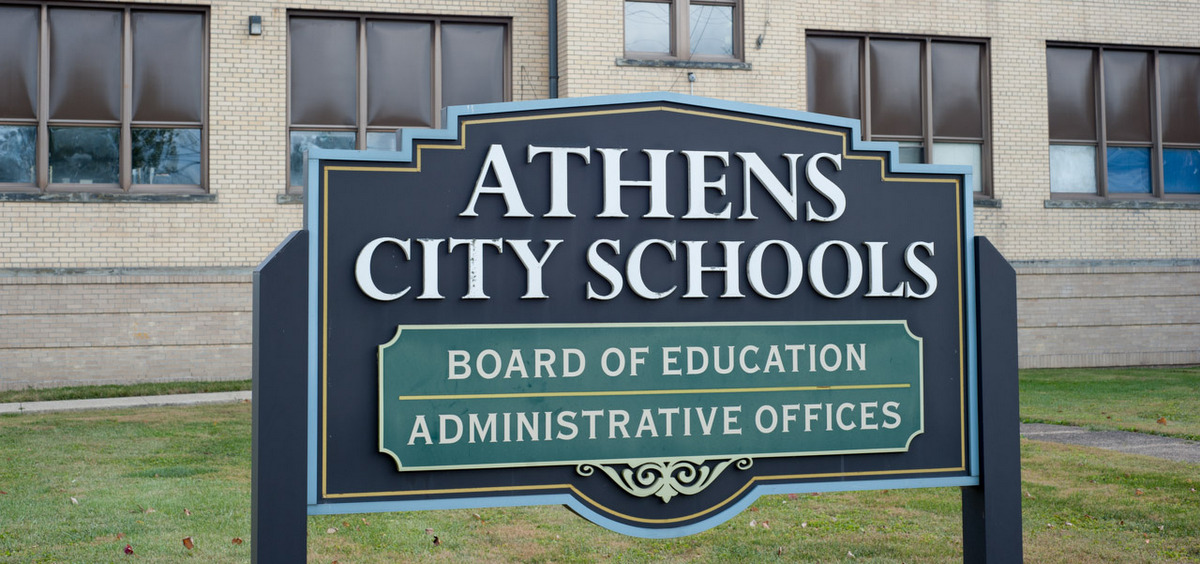News

Teachers and Students Speak Out At Athens School Board Meeting
By: Susan Tebben
Posted on:
While Thursday’s Athens School Board meeting that did not include a recommendation of more cuts to the staff, it did include students and teachers urging the board to find new ways to save money.
Fourteen different speakers stood in front of the board and a larger than usual meeting audience, to address concerns about lost jobs, disappearing classes and miscommunications about financial troubles.
“I have many growing concerns about the decisions being made for this upcoming school year,” said Lindsay West, a kindergarten teacher at West Elementary.
The meeting comes after Superintendent Tom Gibbs first announced that plans would need to be made to anticipate a dismal budget forecast for the district then said the staff cuts would not be part of the strategy for the 2016-2017 year.
In an email to parents, teachers and community members two days prior to the meeting, Gibbs gave a list of recommendations he had to address “financial challenges moving forward.”
These included a possible reduction in force in the 2017-2018 school year, according to the document provided by Gibbs.
For the 2016-2017 school year, a summary of teacher adjustments stated that special education teaching positions at Athens High School and West Elementary School would not be filled after the retirement of the current teachers. The special education teaching position at Eastern Elementary, also vacated by a retirement, will be filled through a transfer from Athens Middle School, but the vacated middle school position will not be filled, according to the summary.
Positions vacated in Morrison-Gordon’s sixth grade, kindergarten and fifth grade positions at West Elementary, kindergarten and first grade positions at The Plains, and both a science position and industrial arts position at Athens Middle School will not be filled.
How will our students be shortchanged in the process,” parent Janice Evans asked. “How does putting people out of work help our local economy?”
But parents and teachers weren’t the only ones asking the board to reconsider class decisions. Several graduates of foreign language classes took time out of their summer to argue against removing AP classes.
“It scares me that we might not have AP Spanish,” said Sadie Stock, who is moving on to pursue a degree in Anthropology with a minor in Spanish. “I have a younger brother and it scares me that he might not have the same opportunities that I had.”
Gibbs told the audience that there has not been a discussion about removing AP Spanish from the curriculum, a comment which invoked a loud outcry from the audience. He clarified to say there had been discussions about removing a section of the class. He also set the record straight on fears about increasing kindergarten classes.
“We will not have 30 students in a kindergarten class,” he said.
Speakers said they wished the board would have communicated the problems before decisions were made about reductions, but also questioned the class size estimates and combining of student services.
“It’s not clear how justification can be made for 28 kids in one class,” said Laura Alloway, a parent of a special needs student at West Elementary. “I don’t see any of these decisions as it regards to educational success.”
Several parents asked to be part of the decision-making process, something with which Board Chair Kim Goldsberry agreed.
“This is where we need to bring in the community to discuss the future,” Goldsberry said.
The five-year forecast given by Treasurer Matt Bunting did not dispel the worries of the administration or the community members at the meeting.
“(The funding forecast) is unlikely, in the next four to five years, to get better,” Bunting said.
Bunting likened the school budget to that of a service industry business, but said whereas a furniture business can cut materials or other operating costs, “we deal in people.”
“That makes it very difficult to cut without cutting people,” Bunting told the crowd.
But the 2015-2016 school year did end on positive budgetary terms, Bunting said, thanks to unexpected delinquent tax settlements of about $100,000. This along with resignations that occurred before the board met for their May meeting, allowed Gibbs to scrap the reduction in force planned for the 2016-2017 year, he said.
In the board agenda draft for Thursday’s meeting, a “placeholder for resolution of necessity for renewing the emergency levy” was included.
The levy would be a “fixed sum” levy, Bunting told the board, to bring in $3.7 million. The levy would be a continuation of a previous operating levy, but the substitution of the levy would allow the district to keep it on the books past the five years for which it was approved by voters.
Gibbs previously said the levy would not bring in any additional money, but would instead allow the school to continue running at its current budget level.
The placeholder resolution was passed by the board, and the emergency levy will now be sent to the state to determine millage, before coming back to the board for final approval.

